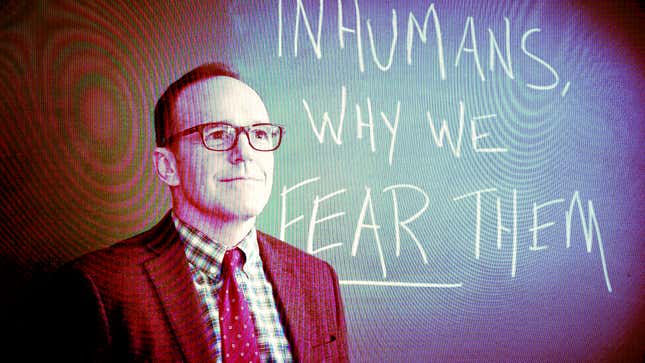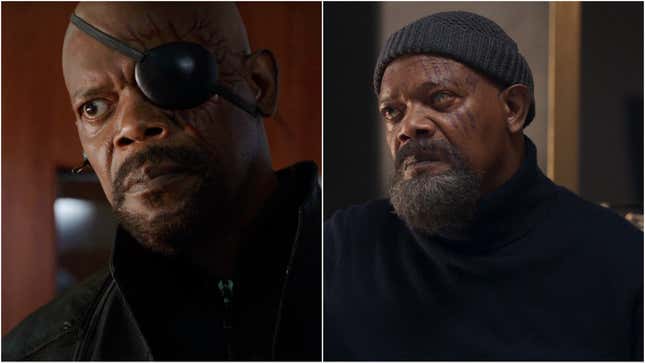
The Marvel Cinematic Universe’s foray into television on Disney+ has been a bit rocky. Early on, shows were presented as important pieces of the MCU canon that just happened to be TV series instead of movies, with WandaVision (at least in theory) establishing the headspace of Wanda Maximoff before Doctor Strange In The Multiverse Of Madness, The Falcon And The Winter Soldier detailing Sam Wilson’s concerns about the burden of the Captain America name before his eventual big-screen return, and Loki creating the whole multiverse that has exhausted us for the last few years—not to mention introducing Jonathan Majors, who (as far as we know) is going to continue playing a big MCU villain for now.
But since then, the Disney+ series might as well have been quietly nudged off into their own corner of that multiverse. Only Ms. Marvel has had a tangible impact on the big leagues of the MCU, which is to say the movies, while shows like Hawkeye and She-Hulk: Attorney At Law have seemingly just been interested in setting up Daredevil: Born Again—a show, not a movie. Recently, Secret Invasion wasted the excitement of giving Samuel L. Jackson’s Nick Fury his own solo story by making that solo story terribly boring (and by introducing a new character who is so powerful that there’s no way she’ll ever be seen again).
This isn’t a new problem for Marvel, though. It predates the current run of Disney+ shows and it even predates the Netflix shows (which always seemed like they’d get in trouble if they ever acknowledged the movies). No, it all started with the first time the MCU tried to move to TV with ABC’s Agents Of S.H.I.E.L.D. (which premiered 10 years ago, on September 24, 2013), a show that initially served as the platonic ideal of this kind of symbiotic cross-medium relationship.
For one thing, one of the main characters of the show was Clark Gregg’s Phil Coulson, a recurring character in the movies—going back to the first Iron Man—who was dramatically killed off in The Avengers, giving it both a tangible connection to the movies and a mystery (how did he survive?) with apparent stakes for the movies. And throughout the show’s first season in particular, it’s clear that the movies are all happening concurrently with the adventures of Coulson, Skye, Ward, May, Fitz, and Simmons on their “Bus,” even if they didn’t get to have fun meeting up with the Avengers (something the show would lampshade from time to time).

Rather than meeting Thor, for example, the S.H.I.E.L.D. team would get called to London to literally clean up after the final battle in Thor: The Dark World. It was, in retrospect, cute to see the direct repercussions of a big, destructive superhero battle. It would’ve been cool to have the Avengers show up and acknowledge that the S.H.I.E.L.D. team was doing important stuff, but the game the show was actually playing was much more exciting. After Thor: The Dark World came Captain America: The Winter Soldier, the movie that revealed that S.H.I.E.L.D. had been infiltrated and corrupted by Hydra. And much like the other MCU crossover, the team was there to clean up after all the exciting things that happened in the movies—but not before finding out that Grant Ward, one of their own, had been with Hydra all along.
It stands as one of the great twists in the history of comic-book movies and television, especially in the MCU, precisely because it perfectly tied together everything that was going on in the movies with everything that had happened on the show, making both things feel bigger than they had previously. It’s a fun twist that still plays really well, if only because of how cruel it is to take a guy who seemed pretty stiff and boring for the whole season and reveal that he was actually a fascist sociopath.
Unfortunately, the movies never returned the favor, refusing to acknowledge any of the seemingly big and important things that had happened over the rest of Agents Of S.H.I.E.L.D.’s run, including Coulson’s rebirth, the arrival of Inhumans, and the discovery of the Darkhold—a magical book that later played an important role in WandaVision, with no mention of the important role it had played on the earlier show. Agents Of S.H.I.E.L.D. still did a handful of nods to what was happening in the movies, like establishing where the Helicarrier comes from in Avengers: Age Of Ultron, or referencing Civil War’s Sokovia Accords, or giving vague mention to an attack on New York (the arrival of Thanos’ Black Order in Avengers: Infinity War)—but none of it felt crucial anymore.
When Agents Of S.H.I.E.L.D. began, the MCU was just stretching its legs and enjoying a post-The Avengers victory lap. It could do no wrong, and there suddenly wasn’t enough MCU to satisfy its growing number of fans. But as soon as its second season, the movies had outgrown any need for a spin-off on regular television. Guardians Of The Galaxy proved that the MCU was basically unstoppable and could turn anything into a hit without using slightly more down-to-Earth characters and concepts to justify it; and when the MCU committed to the Infinity Stones being the driving force of all stories rather than S.H.I.E.L.D. or Hydra or anything else that had seemed like it was So Important in the first few years, then Agents Of S.H.I.E.L.D. became irrelevant to the larger MCU—a tie-in that you could skip or follow without losing or gaining any particular insight into the larger universe.
This is the same thing that has happened with the Disney+ shows: The Marvel machine got big enough to justify them, and then it got too big to need them. Now they’re working to sustain themselves rather than the larger universe of the movies, which is fine (some of those Netflix shows were really good, and that’s all they did), but it means more shows like Secret Invasion that ultimately amount to nothing, at least in terms of the main universe, are probably on the way.
Agents Of S.H.I.E.L.D. did its relatively small part in expanding the MCU, but the MCU never felt the need to make Agents Of S.H.I.E.L.D. any bigger than it was because Marvel chose to emphasize the movies above all else. And it’s happening again. And it’s going to happen forever.